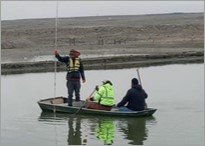Fact Sheet: EPA’s Compliance Advisors for Sustainable Water Systems Program
Learn how small drinking water and wastewater systems can qualify for no-cost technical assistance to achieve and maintain compliance with the Clean Water Act and Safe Water Drinking Act.
How Can a Compliance Advisor Help You and Your Community?
The U.S. Environmental Protection Agency’s or EPA's compliance advisors are a team of engineers, operators, scientists, and communications professionals—consultants to EPA—who provide customized technical assistance at no cost to small drinking water and wastewater utilities to help them achieve and maintain compliance. Advisors have the technical expertise and a proven process (shown below), used successfully with many different systems, to assess technical and compliance issues, plan for recommended improvements, and help small systems maintain or return to compliance. In short, they make compliance uncomplicated. Compliance advisor support is not a one-time event. Compliance advisors work with individual systems over 12–18 months to ensure they have the knowledge and tools needed to address their water quality issues.

Compliance advisors specialize in working with EPA regional offices and state governments to help small communities, focusing where possible on communities with environmental justice concerns. They can help troubleshoot issues, develop recommendations to return public and private water systems to compliance, and increase the operators’ technical knowledge so they can maintain compliance. System participation is voluntary. Some systems are addressing enforcement actions, but participating in the Compliance Advisor Program does not exclude systems from regular compliance obligations such as inspections or enforcement. Compliance advisors are limited to providing technical assistance. They cannot provide capital funding, conduct operation and maintenance or O&M activities, or develop detailed engineering studies. Some common types of assistance are:

Photo credit: ERG
- Identifying the water system’s compliance and other technical challenges.
- Summarizing monitoring and reporting requirements understandably and accessibly for the operator.
- Preparing required documents such as risk assessments, emergency response plans, and lead service line inventories for operators who lack the knowledge or ability to develop them.
- Drafting helpful documents for operators, including standard operating procedures and O&M manuals.
- Assisting wastewater system operators with public outreach for concerns about fats, oils, and grease; disposable wipes; and required public notifications.
- Collecting system information using asset management and knowledge retention tools to help operators with capital planning and to pass system information on to the next generation of operators.
Why Should Water Systems Work with Compliance Advisors?
Small water systems often lack adequately trained staff, full knowledge of regulatory requirements, and the managerial and technical expertise to address issues of noncompliance. Compliance advisors help small drinking water and wastewater systems that struggle to comply by:
- Providing targeted, on-site one-on-one training on a wide variety of topics.
- Troubleshooting problems and identifying potential solutions.
- Developing tools such as written procedures, checklists, or manuals to help staff do their jobs.
| Drinking Water Resources | Universal Resources | Wastewater Resources |
|---|---|---|
|
|
|
When Are Communities Eligible for Compliance Advisor Assistance?
EPA’s Compliance Advisor Program generally focuses on drinking water and wastewater systems that:
- Serve populations of 10,000 or fewer,
- Have problems coming into and/or maintaining compliance with the public water system and/or discharge permit requirements under the Clean Water Act, and
- Agree to participate in the program and have operators and managers who are engaged and willing to work with the compliance advisors.
In general, the Compliance Advisor Program supports publicly owned systems such as towns, municipal systems, water districts, and Tribal drinking water and wastewater systems. If there is a compelling need and a recommendation from the state, other systems such as unincorporated communities, subdivisions, homeowner associations, and trailer parks may also be eligible for assistance. Also, water systems which have violated an environmental statute and agreed to an enforcement settlement agreement can participate in the program.
How Can EPA Regions and States Nominate Systems for the Program?
EPA’s Office of Compliance administers the Compliance Advisor Program and accepts applications from EPA regional offices on a rolling basis. The office chooses communities based on the above eligibility criteria, available resources, and the priority assigned to the community by the regional office. States and Tribes interested in obtaining Compliance Advisor Program support for their water systems should reach out to their EPA regional Safe Drinking Water Act or Clean Water Act inspection and enforcement staff.
Learn more about the Compliance Advisor Program by visiting EPA’s compliance advisor web page.
For more information, contact [email protected].
